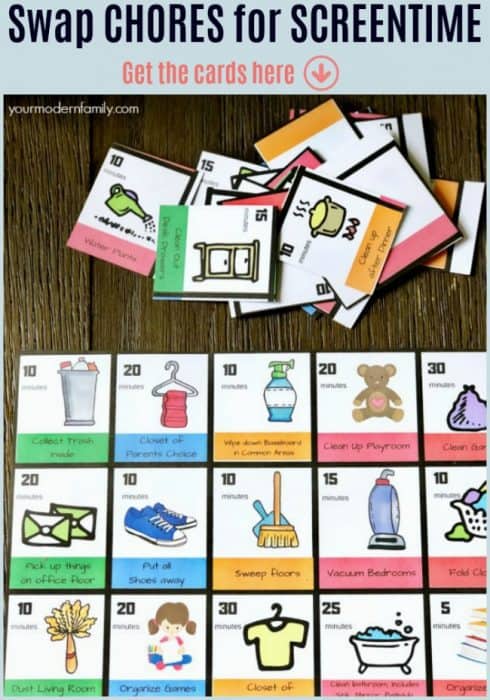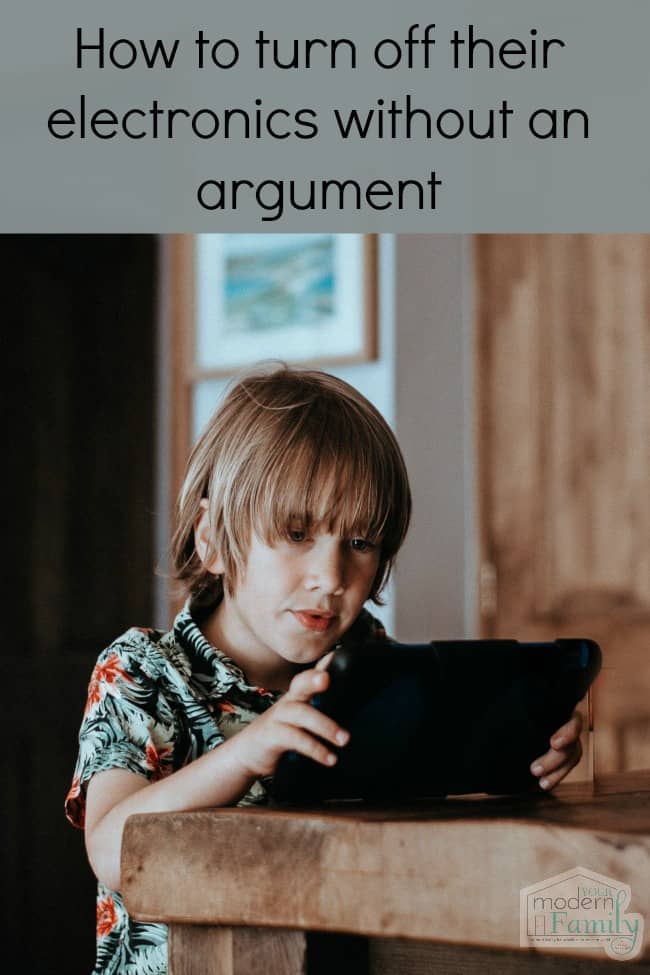This post may contain affiliate links. Please read our disclosure policy.
My friend Samantha told me something years ago, and it has stuck with me ever since. I now tell parents this tip to help them have their kids turn off electronics without an argument.
Personally, we like to use the Swap Chores for Screen Time Cards because it eliminates the frustration of too-much-screen-time. However, if you are looking for a way to stop arguments (or complaints) when you ask them to turn off the screens or game, this works.
Samantha’s advice works in so many areas: screen time, switching activities, asking them to do their chores, getting ready to leave, etc…

Samantha put it into a scenario that I couldn’t ignore. I wanted to share it with you today because it shed much light on how I saw it.
Picture this scenario:
You are cozy on the sofa, watching your favorite movie or sport on TV (think of that movie in your mind). You are right at the best part of the movie or game, where it is all about to wrap up and come to that ending that you’ve been waiting for (think of that scene in your mind).
Now picture your spouse or your kids calling to you from the kitchen “Go put your shoes away! You left them out!” or “We are going to the store. Let’s go.”
Or worse- picture someone walking over and just turning it off – just hitting the POWER button and shutting it down.
You would probably do one of these things:
- Let it go in one ear & out the other (ignoring everyone)
- Stall, while saying something like, “Hang on – this is almost over.”
- Become angry
Time to Swap roles
Imagine your child is playing a game or watching a show and you say, “Go put your shoes away. You left them out.”
Or you say, “We are going to the store. Come on… time to go.”
Or worse- picture yourself walking over and just turning it off – just hitting the POWER button and shutting it down.
Your child is probably going to do one of two things:
- Let it go in one ear & out the other (ignoring everyone)
- Stall, while saying something like, “Hang on – this is almost over.”
- Become angry
Sound familiar?
In the end, the outcome is not what you are hoping for… You might lose your temper, starting an argument. You yell at the kids, you take away electronics, and everyone is angry and upset.
What does this mean?
When I thought about this and what it meant for our kids, I immediately had respect for them that I hadn’t had before. It didn’t really matter to me that they were on “Level Five of Minecraft” because they could play it later, right?
Well, when I switched roles in my mind…
I realized what it meant.
What if I were in the middle of a paragraph in a book, right in the middle of a sentence, and someone took my book away?
What if I were halfway through that paragraph and they just yanked the book out of my hand, or came over and shut it, or yelled at me about putting it down before finishing that paragraph?
I’d be upset. I’d be angry. I’d feel disrespected. I’d feel hurt. I’d be annoyed. The same as our kids feel when we do this to them.
Yes, we are the parents and they should listen, but at the same time, it just takes putting ourselves in their shoes to begin to understand how they are feeling.
Think about how involved we become in our books, TV shows, articles online, texts, movies, or phone conversations. Think about how it affects how we are thinking and feeling.
Think about how all of those things deserve a stopping point… just like the games or shows that our kids are watching. A one-minute “wrap-up” time.
Our kids are no different.
What can we do about it?
My friend had a great idea. She said that she does two things:
1- Give The Kids A Warning That Time Is Almost Up.
Something as simple as, “It’s almost time to go. Please finish that chapter, and then close the book.”
Or “On the next commercial break, I need you to go clean your room. If you finish, you can finish your show. If not, you’ll have to catch it next time.”
Or “When you finish that level or die in the game, I need you to turn it off.”
2- She Reminds Them Again When That Time Has Arrived.
When she sees that it is the commercial break, or that they are almost done with the level, she distracts them just a bit by asking them what’s going on.
That little conversation turns their attention from the electronics/book/game back to her. Kids need to wind-down from electronics, as this study shows.
This works as a way to teach them that turning it off is not the end of the world. Eventually, they’ll be fine with it.
Those two things take a total of 30 seconds and save you ten minutes of whining, nagging, calming-down.
It also creates respect: for you and your child.
I know that we are not our children’s friends. I also understand that as parents, we want our children to do what is asked of them. However, I also respect them, as people.
This means that I want to show them that they are important and that what they say is important. I would give everyone else these simple courtesies and I give them to our children, too.
Another Idea: Give them an allotted time before they start.
We found that by using the Swap Chores for Screen Time Cards, it completely eliminated this situation of frustration when it was time to be done. Instead, they know exactly how long they have online, so they can prepare to be finished by the time that their ‘allotted time’ is done.
We love these chores for screen time cards because it teaches kids the very important lesson of “Work before play.” It also encourages them to help out MORE around the house. They’ll be asking you if they can do extra chores. They’ll learn the importance of pitching in & working hard before they relax.















